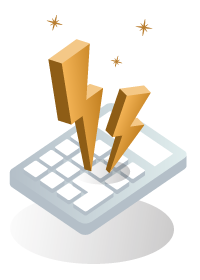What’s the Average Electricity Usage UK?

How much is the average electricity usage? How much should I be using for gas? Most of the time, we can reduce our monthly energy bills by reducing our consumption. Read on to find out what the average usage is and how it’s calculated.
What’s the Average Energy Usage UK?

The average energy usage in the UK is the amount of energy consumed by a household over a year. This is usually given separately for electricity and for gas, and is calculated in kilowatt hours (kWh).
If you are miles over the average rate for the size of your household, it is a sign that you could be wasting a lot of energy and should try to be more energy efficient to cut down on your bills.
What is a kilowatt hour? A kilowatt hour (kWh) is equal to one unit of energy that is used by a household or business. The higher the number of kilowatt hours you use, the more energy you consume.
These rates for the UK can also help you get an accurate quote when looking for a new energy provider. The more accurate your quote, the better you know how much you could save when you switch!
Average electricity and gas usage is calculated using Typical Domestic Consumption Values (TDCV). These values are calculated and reassessed every two years by the energy regulator Ofgem. They were most recently reassessed in 2020.

Average Electricity UK Household Usage
Households make up the bulk of most energy usage in the UK. Even though businesses and even churches use more, households have a big impact on the average usage.
Electricity is more expensive than gas, so if a lot of your household appliances run on electric (e.g. your boiler or oven), your energy bills will likely be higher than households that power such appliances with gas.
In general, electricity usage in the UK is lower than gas consumption. The table below shows the most recent annual average electricity usage UK figures for small, medium and large households:
| Fuel | Level of Consumption | Consumption |
|---|---|---|
| Electricity | Low (1-2 bedrooms/flat) | 1,800 kWh |
| Medium (3-4 bedrooms) | 2,900 kWh | |
| High (5+ bedrooms) | 4,300 kWh |
Figures correct as of March 2021.
Average Electricity UK Household Usage for Economy 7
Customers on Economy 7 tariffs typically use more electricity than consumers with standard meters, prepayment meters or smart meters. The latest UK average electricity usage for Economy 7 customers are listed in the table below:
| Fuel | Level of Consumption | Consumption |
|---|---|---|
| Electricity | Low (1-2 bedrooms/flat) | 2,400 kWh |
| Medium (3-4 bedrooms) | 4,200 kWh | |
| High (5+ bedrooms) | 7,100 kWh |
Figures correct as of March 2021.
When getting a quote for an Economy 7 tariff, you will be asked for your typical electricity split, meaning what percentage of your average electricity consumption takes place in the day and how much at night. This is important as Economy 7 tariffs charge two different electricity rates: one during peak hours and one during off-peak hours.
The average electricity split for Economy 7 customers in the UK is listed in the following table:
| Peak hours (day) | Off-Peak hours (night) |
|---|---|
| 58% | 42% |
Figures correct as of March 2021.

What Is the Average Electricity Usage per Day UK?
The exact amount of gas and electricity that you use per day will vary depending on the appliances that you use, the day of the week (most households use more energy on the weekend), and the season (average usage levels rise during the winter).
The following figures give an estimate of the average electricity usage and average gas usage per day in the UK:
- Electricity - between 8 and 10 kWh per day
- Gas - between 33 and 38 kWh per day
With increasing energy efficiency, you can reduce the amount of electricity you are using daily.
Average Gas Usage for UK Households
As we mentioned earlier, households in the UK typically use more gas than electricity. In fact, the average gas usage for UK households is typically more than double than the average electricity consumption. As a result, the unit rate for gas is cheaper than the unit rate for electricity.
The table below shows the most recent annual average gas usage UK figures for small, medium and large households:
| Fuel | Level of consumption | Consumption |
|---|---|---|
| Gas | Low (1-2 bedrooms/flat) | 8,000 kWh |
| Medium (3-4 bedrooms) | 12,000 kWh | |
| High (5+ bedrooms) | 17,000 kWh |
Figures correct as of March 2021.
How Much Energy Do You Use?

All of the rates we have discussed above are averages. You might find you use more than the average electricity usage rates and/or less than the average gas usage rates mentioned.
Finding the best energy deal possible means getting the most accurate quote. The best way to get an accurate quote is to know your actual gas and electricity usage.
Use our handy energy usage calculator to see how much energy you use per year in just a few minutes. Simply enter how many bedrooms and occupants your home has, whether you use gas or electricity to heat your house, water and cook, and what electric appliances you have, and we can tell you how much energy you use.
You can then use this personalised usage rate to compare providers and find the best deal for your household.
How Is My Bill Calculated?

Gas and electricity bills vary based on a number of factors, including:
- The region you live in - unit rates and standing charges vary between areas
- You energy supplier - suppliers charge different rates
- Type of tariff you are on - variable tariffs are typically more expensive than fixed-rate tariffs
- Your energy usage - the amount of energy you use will affect how much you pay
In the most recent estimate from March 2021, Ofgem found that the average yearly energy bill for a standard variable tariff paid for by direct debit totalled £1,042 for gas and electricity (dual fuel).
What Are Unit Rates and Standing Charges?
Your energy bill is made up of two main costs: the Unit Rate and the Standing Charge.
Unit Rates
The unit rate has a big impact on your overall bill since the more kilowatt hours you use will increase the amount you pay at the end. Suppliers price their energy by telling you how much a kilowatt hour is worth with them and multiplying it with the number you’ve used.
Unit Rate Example If an energy company charges you 15p per kilowatt hour for the unit rate, and you use the average 242 kWh in a month, the cost for this will be:
15p x 242 kWh = £36.30
As you can see, the more kWh you use, this will increase your bill at the end of the month.
The unit rate is similar to the price per gallon of petrol if you own a car, so just like when you fill up your car and you try to find the petrol station with the best price per gallon, it’s worth going the extra mile to find a supplier with lower unit rates.
Standing Charge
The Standing Charge is what you pay to have your property connected up to the National Grid. This is a little like a subscription fee that you pay daily to keep your supply of electricity and gas to your property.
Standing Charge Example Your Standing Charge will typically be charged daily and will usually run for 30 days. So if your energy company charges you 20p per day, and your bill runs for 30 days, the cost for this will be:
25p x 30 days = £7.50
This is then added to your Unit Rate to give you the full bill for the month:
Unit Rate £36.30 + Standing Charge £7.50 = Total Bill £43.80
If you are on a fixed tariff, you will pay the same Standing Charge for as long as your tariff lasts so it’s a good idea to try and find a company that has the lowest Standing Charge available for you to save the most in the long-term.
How To Reduce Your Energy Usage
Reducing your energy usage is essential both for saving on your energy bill and for helping reduce carbon emissions. Even if you are on a 100% renewable tariff, your bills will still be affected by the amount of energy you are using and current down is the best way to save.
Here's a list of some quick fixes to boost your energy efficiency at home:
- Insulate your home
- Double glazing
- Energy saving lightbulbs
- Get a smart meter
- Switch appliance off if you're not using them
- Get a smart thermostat
If you want to find out more how to optimise the energy in your home, check out our full Energy Efficiency guide.

